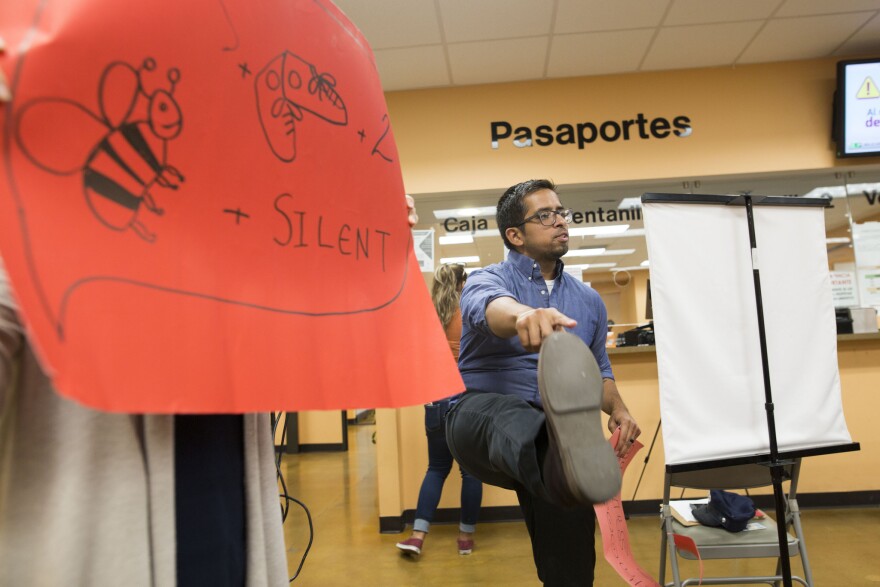Candelario Vazquez, 34, stands in front of a group of 20 people. None of the adults and children, some of them squirming in their hard plastic chairs, have asked to be in the audience.
“Good morning, friends,” he says in Spanish. Vazquez, the health and safety organizer for the immigrants’ rights nonprofit Workers Defense Project, wears glasses and has specks of gray in his black hair.
As he addresses the small crowd, he does battle with an intercom, over which names are called out. Sometimes, he says, "I [have to] stop every five seconds.”
Vazquez is at the Consulate General of Mexico in downtown Austin to talk to people waiting for visas and passports about their rights ahead of Senate Bill 4. The bill, signed into law by Gov. Greg Abbott in May, goes into effect Sept. 1, unless a court puts a halt to it. Among other requirements, SB 4 prohibits law enforcement agencies from adopting policies that limit officers’ ability to ask peoples’ immigration statuses after they’ve been detained or arrested.
Cities across the state, including Austin, have joined a lawsuit challenging the bill. And while they await a ruling, local immigrants’ rights groups, including Catholic Charities of Central Texas and Here to Stay, are hosting “Know Your Rights” seminars, some of which go on for hours.
Since no one has actually signed up for Vazquez’s talk, his lasts about 15 minutes.
“You have rights when it comes to police and immigration authorities,” he says. The first right is to remain silent if stopped.
Vazquez unravels a red poster. “I choose to be silent,” he says slowly in English.
On the poster, he has drawn an eyeball, shoes, the number two, a bumble bee and the word “silent.” “It’s like ‘eye,’ ‘choose,’ like my shoes,” he says, lifting up his leg to point at his shoe. “’Two,’ be, like a bee, ‘silent.’” The crowd repeats it back to him in English.

If you can’t find the words, Vazquez says, hand the officer a wallet-sized piece of paper, similar to a business card. One part of the card reads: “I do not wish to speak with you, answer your questions, or sign or hand you any documents based on my 5th Amendment rights under the United States Constitution.”
“Present this card when you want to remain silent,” he says as he hands them out. He encourages people to take multiple cards to give to neighbors and family. A man who had been speaking with an attendant at one of the counters taps Vazquez on the arm, asking for one.
Soon, it’s time for Vazquez to wrap up. Audience members can be called away by consulate workers at any moment. He asks for a volunteer, and Rosa Álvarez raises her hand.
Vazquez pulls out of his bag a navy cap with the words “Special Police” across it and puts it on. He tells Álvarez that she’s walking down Sixth Street, having just finished shopping when she is stopped by a cop. He begins speaking Spanish with an English accent, and he’s suddenly rude and domineering: “What are you doing on this street?” (Later, Vazquez explains why he takes on this demeanor: “I watched a lot of B-movies growing up. It always had the really villainous cop in the middle of the desert patrolling communities of color.”)
Álvarez fumbles over the words she’s just been taught. A man in the audience cues her.
“I choose to be silent,” he says. She repeats it to Vazquez. He asks to see her ID.
She looks nervous and afraid. The man who helped her earlier tells her to hand him the card. She does.
“Oh, you don’t want to talk to me anymore?” Vazquez asks, before dismissing her. “Go on, then.”
As for Vazquez, he'll be back at the consulate next week to teach other unsuspecting audience members about their rights.






